Samaaro + Your CRM: Zero Integration Fee for Annual Sign-Ups Until 30 June, 2025
- 00Days
- 00Hrs
- 00Min
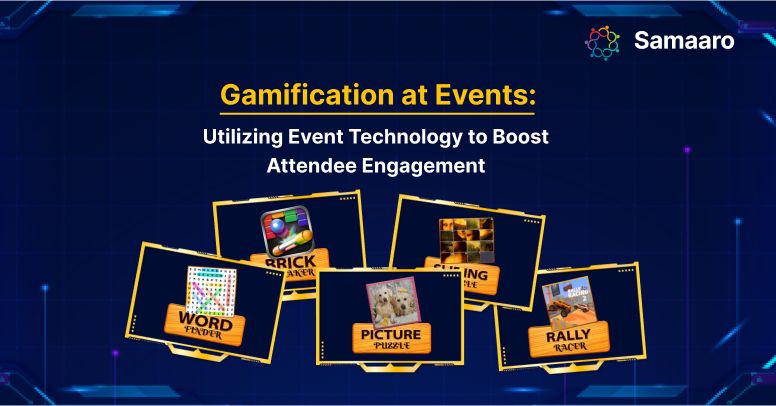
When you are planning an event, one of your primary goals will be to create the maximum amount of attendee engagement. Engaged attendees are far more likely to find value in the event, participate during session times, connect with other attendees and leave with a positive impression. Engagement will enhance the event experience itself, and lead to essential business outcomes for events such as building relationships, sharing tips and knowledge, and creating partnerships.
So how do we create engagement for the attendees?
The answer is – Gamification! When done correctly, gamification can employ different elements of games like points, badges, leaderboards, challenges, and rewards to create richer experiences thereby engaging attendees’ minds more effectively.
In addition to enhancing and creating a more engaging experience for the attendees, gamification through event technology creates another avenue for engagement and allows you to achieve your event goals faster and more successfully.
Let’s examine why gamification is strong at events, and explore ways to gamify your next event, including tips to maximize engagement
While attendee engagement is valuable, gamification has benefits beyond attendee engagement that include event return on investment (ROI) and provide valuable insight into planning of future events. Here are several reasons to utilize gamification at your next event:
Lead Generation – gamification strategies creates an environment for the attendees to partake in active event participation such as challenges, quizzes, and scavenger hunts. These strategies create an opportunity for event organizers to collect valuable attendee information like attendee contact info, attendee preferences, and attendee interests and generate valuable leads for current and future events.
ROI – Gamification will improve the experience overall, and in turn, increase attendee satisfaction. This can result in positive referrals, recommendations, and repeat attendees, which benefits ROI. Further, gamification provides opportunities for showcasing sponsors, increased exposure for sponsors, and attracting potential new sponsors for future events – all of which improves business and ROI.
Sponsor Exposure: Gamification offers sponsors interactive experiences that provide valuable brand exposure. Sponsors can be showcased in specific challenges, on leaderboards, or within branded game elements, creating awareness and recognition. The nature of gamified sponsor events requires attendees to actively participate and engage, allowing sponsors to showcase their products/services, network with potential customers, gather leads, and ultimately convert business.
Attendee Engagement: Gamification provides attendees with an interactive experience to engage in event content through goals, rewards, and competition. Gamification turns networking into a fun & engaging experience while helping to develop professional relationships amongst attendees.
Through gamification, event planners can not only enhance the attendee experience, but they are also able to generate leads, enhance ROI, and showcase sponsor exposure – all outcomes equating to overall successful and effective events for event planners, attendees, and sponsors alike.
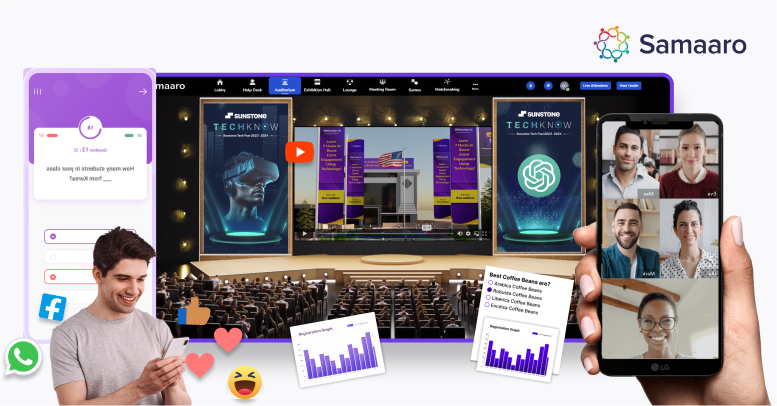
Event Technology has changed how events are planned, delivered, and experienced. Event technology includes numerous digital tools and platforms that ultimately enhance the attendee experience while streamlining the event process. By leveraging event technology event planners are able to automate gamified experiences, easily track progress, update leaderboards and distribute rewards. Real time engagement improves attendee experience, generates excitement, and creates valuable data for future events.
Assessing Event Technologies that Can Support Gamification
Mobile Event Apps – Mobile event apps are a very popular solution for gaming because of their flexibility and availability. It is easy to incorporate challenges, quizzes, surveys, and networking element features into a mobile event app. Since attendees can utilize their own smartphones to access any gamified elements, they will be able to play immediately and receive alerts and updates designed for the event.
Event Technology Platforms – An event platform can do even more to support gamification. An event platform may be able to host virtual games and interactive experiences or offer an area for participants to view their dashboard. They may also create an opportunity for social media interaction. This gives participants a chance to earn points, badges, and trophies and create a culture of sharing with other participants.
QR Codes – Quick Response (QR) codes are quickly becoming the most popular option for gamification at events. QR Codes are placed at spots throughout a venue to allow attendees to scan for gamification content. Gamified content can be clues, challenges, or bonus points. QR Codes can also provide solutions for networking where attendees can exchange contact information digitally or participate in a gamified activity or experience.
Once you have event technology for gamification, you will need to apply it to effectively engage the audience. You can program event technology to foster interactive and immersive experiences that will engage and involve participants. Now let’s discuss some gamifications strategies for events.
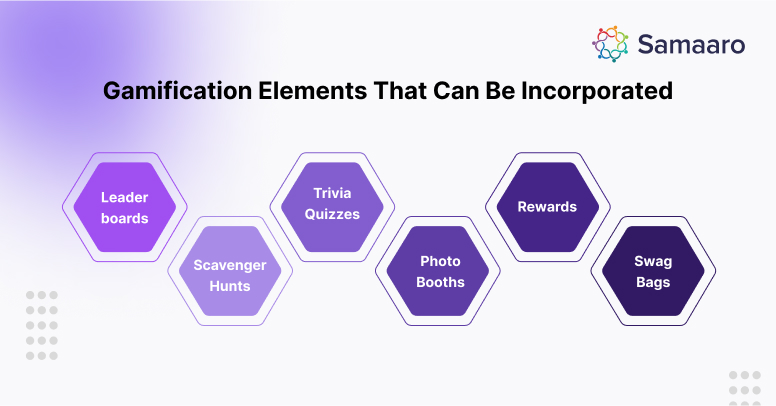
When looking to source gamification strategies for in-person events, establish your objectives. This will help define what your gamification experiences should achieve and how they align with your overall event goals. For example, you might want to stimulate attendee engagement, facilitate networking, or enhance attendance at sessions and activities. Here are examples of Game Mechanics that you can incorporate into your event.
Developing Game Mechanics and Elements for engagement
For gamification to be engaging, fun must be the important element of good game mechanics and elements. Here are some examples:
Gamification can help enhance the attendee experience in several ways. Consider the following ideas:
It is critical to explore meaningful metrics and tools to accurately gauge the impact to measure what success looks like for each of its gamification strategies considered. Here are a few options:
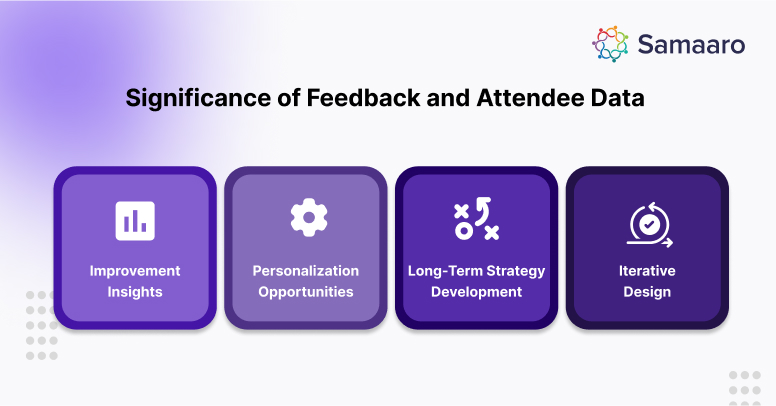
In conclusion, event organizers should think about and embrace gamification in various aspects of event planning as a tool to create fun, interactive, memorable experiences at events.
Event organizers can create varying levels of engagement and depth within systems that facilitate engagement, connections, and results with the support of event technology within effective game mechanics and gamification framework models.
Gamification can unlock the best of what events can be through evaluation, testing, and feedback regarding gamification experiences that make the event memorable and talked about by attendees for years.
For an event experience that delivers, these recommendations highlight the importance of event technology. Reach out to Samaaro today to learn more about event technology solutions that can support gamifying your next event experience and just how immersive and engaging it can be for attendees.

Built for modern marketing teams, Samaaro’s AI-powered event-tech platform helps you run events more efficiently, reduce manual work, engage attendees, capture qualified leads and gain real-time visibility into your events’ performance.
Location
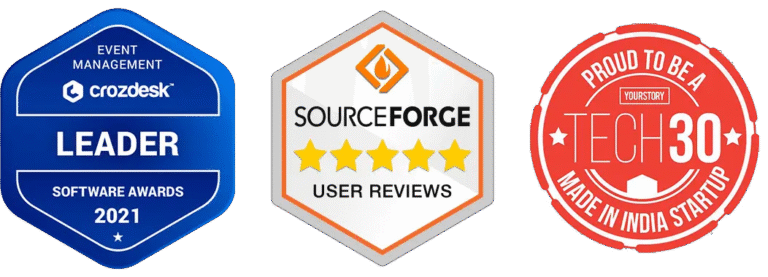

© 2026 — Samaaro. All Rights Reserved.